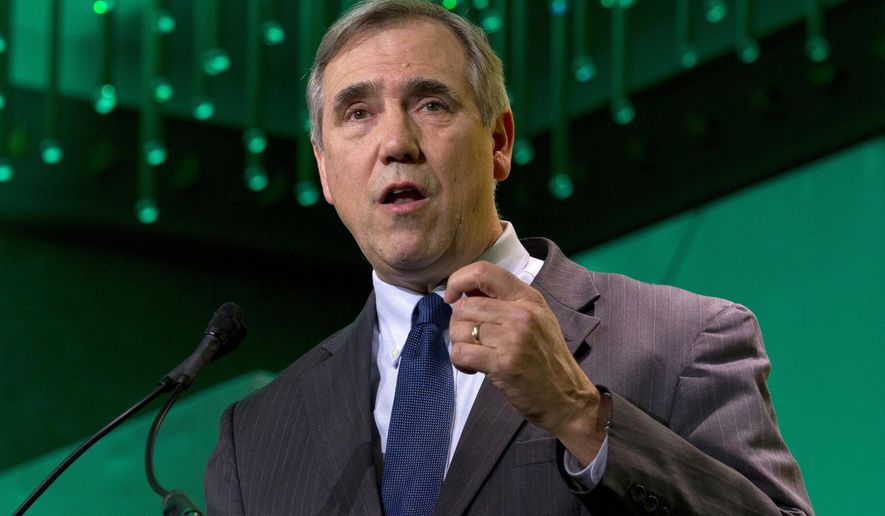Senate Democrats scrambled Tuesday in search of an alternative to change the filibuster without blowing it up after the conference fractured over a plan to use the “nuclear option.”
The effort is particularly complicated since any change to the Senate’s longstanding rules and traditions require unanimous support from all 50 Senate Democrats in the chamber that’s evenly split between the two parties.
“With our 50-50 Senate and zero Republican support, it’s not going to be easy,” said Sen. Jeff Merkley, Oregon Democrat. “But we must fight with everything we’ve got to get it done.”
Democrats have little time to come up with a solution. Senate Majority Leader Charles E. Schumer, New York Democrat, set a vote on President Biden’s rewrite of the nation’s voting laws this week. When that bill fails, as expected, in a GOP filibuster, Mr. Schumer has pledged to bring up a rules change.
Initially, Democrats planned either a full abrogation of the filibuster or a one-time carveout for Mr. Biden’s voting measures. That plan was scrapped when Sen. Kyrsten Sinema, Arizona Democrat, last week announced her opposition to abolishing or weakening the filibuster, which requires 60 votes for most legislation to survive.
“There is no need for me to restate my long-standing support for the 60-vote threshold to pass legislation,” said Ms. Sinema, Arizona Democrat. “Eliminating the 60-vote threshold on a party-line [vote], with the thinnest possible majorities, to pass these bills that I support will not guarantee that we prevent demagogues from winning office.”
The most likely alternative to gutting the filibuster outright will be to change the Senate rules to require lawmakers to mount an old-fashioned “talking filibuster,” according to Democratic senators.
The change would require senators to speak continuously on the floor in objection to a bill. Under the proposal, once all speeches have been exhausted only a simple majority would be required to pass a bill.
Lawmakers currently are allowed to merely object to ending debate, forcing leaders to round up the votes necessary to overcome the 60-vote threshold.
“I’ve said for months the best way to restore the Senate — to make it work better and to make it work in a way that approaches what it used to be — is to have virtually unlimited time to speak for or against a bill … and a lot of amendments,” said Sen. Bob Casey, Pennsylvania Democrat. “But you shouldn’t on top of that [have to] get 60 votes.”
At least one prominent Democratic swing vote, Sen. Joe Manchin III of West Virginia, disagrees. He said that a talking filibuster would be useless without the 60-vote threshold required to end debate.
“I love the talking filibuster, I think we should be transparent about how we do business here or the lack of doing business,” Mr. Manchin said Tuesday. “In the history of our country, there has never been a simple majority vote to [end] debate … I don’t know how you break a rule to make a rule, we’ve never done this.”
He said that keeping the filibuster intact is the only way to preserve the checks and balances of constitutional government.
“Think if you have a situation that we have right now, where you have the executive branch of government and you have congress they’re all the same party,” said Mr. Manchin. “There is no checks and balances because you sweep right through and the same thing could happen if Republicans control everything.”
He insisted that any change to the Senate’s rules must be bipartisan.
Lawmakers are eager to find a solution that can be supported by all 50 Senate Democrats. Mr. Biden has lobbied lawmakers privately to jettison the filibuster, even traveling to Capitol Hill last week to press his case in person to Senate Democrats.
Since the 2020 election, Democrats have argued that federal action is required to combat a slew of new voting laws in Republican-run states. Last year, Democrats attempted no less than three times to pass legislation overturning the new state election laws, which the GOP call election security measures such as voter ID requirements and restrictions on mail-in ballots.
While the Democrats’ efforts garnered unanimous support within their party, the bills failed to overcome a GOP filibuster. Instead of giving up the fight, Democrats began angling to use the so-called “nuclear option” to blow up the filibuster.
“State legislatures are moving aggressively to suppress the vote and to impose extreme gerrymandering among many other things,” said Sen. Bernard Sanders, Vermont independent. “And anybody who believes in American democracy has got to vote to enable us to go forward … to suspend the filibuster, at least on this vote.”
• Haris Alic can be reached at halic@washingtontimes.com.
• Mica Soellner can be reached at msoellner@washingtontimes.com.




Please read our comment policy before commenting.